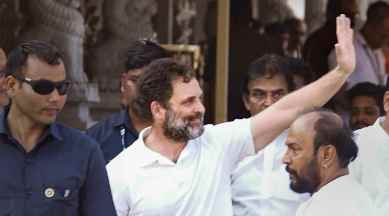Stay updated with the latest - Click here to follow us on Instagram
In Gujarat HC, Rahul Gandhi advances 6 grounds to seek stay on defamation conviction
The Congress leader’s counsel says the complaint was non-maintainable as the offence is ‘in personam’ and that entertaining the complaint would therefore mean a ‘mockery of the defamation law’.

As the Gujarat High Court began hearing Congress leader Rahul Gandhi’s revision application in a criminal defamation case on Saturday, his counsel said there were six basic grounds on which the former could seek a stay on his conviction, which had led to his disqualification as an MP.
Appearing before Justice Hemant Prachchhak, senior advocate Abhishek Manu Singhvi submitted that the conviction was not of an offence of moral turpitude, nor did it comprise a serious offence as defined under various judgments.
The judgments that the Surat sessions court had relied on while rejecting Gandhi’s plea for a stay on his conviction would instead hold a reverse benefit for the Congress leader as the judgments were for serious offences such as murder, abduction and rape, Singhvi said.
By denying Gandhi’s plea for a stay on his conviction in such a case of criminal defamation, the court would be “rewriting” the scope of section 389 of the Code of Criminal Procedure, Singhvi further said.
Secondly, Singhvi touched on the jurisdiction and locus of the complainant, Purnesh Modi, and submitted that Gandhi’s statement made in Kolar, Karnataka, had not invoked any identifiable class of people, adding that none of the three people named in the statement—Nirav Modi, Mehul Choksi and Vijay Mallya—was the complainant in the case.
Singhvi submitted that the defamation complaint was non-maintainable as the offence is “in personam” (directed against a specific person or persons) and creates a bar on jurisdiction therein. To entertain the complaint would therefore, he argued, mean “you make a fool of the law” and a “mockery of the defamation law”.
Thirdly, Singhvi cited several points to argue the trial was vitiated. He submitted that the Surat court handed Gandhi the maximum punishment after conducting a hearing on the punishment aspect for only 10 minutes.
The sentencing was reasoned on the ground that Gandhi had earlier been admonished by the Supreme Court on his statements about the Rafale deal, he argued and pointed out that the admonishment had in fact come seven months after the statement was made in Kolar.
It was also submitted that the magistrate court, while issuing the summons in May 2019, had “zero prosecutable evidence”.
Singhvi then pointed out that the CrPC section 313 statements were recorded well after a year of the filing of the complaint.
Singhvi will continue his arguments in the second sitting.